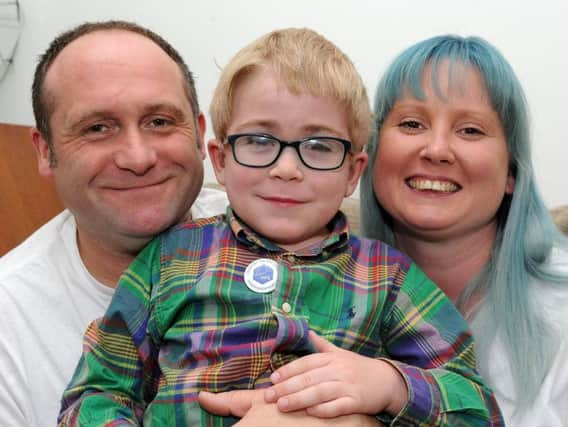'My little boy has been given a death sentence' - Sheffield parents to battle drug funding cut to help son with ultra-rare disease


A devastated mum says her son has been given a ‘death sentence’ after funding was cut for drugs which could save him.
Harley Bond, aged four, has Sanfilippo – a life-limiting condition that affects the central nervous system. Mum Emma, 36, of Darnall, hit out at the NHS and the National Institute for Clinical Excellence for cutting funding for ultra-rare conditions – which might have given her son a chance.
Advertisement
Hide AdAdvertisement
Hide AdShe said: “It’s like they don’t care and this isn’t one bit fair. It’s like they’re giving him a death sentence.
“Give Harley a chance.”
Little Harley Bond is just like any other four-year-old boy.
“He’s such a lovely little boy who just wants to play,” says his mum Emma Siddall.
But, heartbreakingly, she adds: “It’s horrible to know that he doesn’t know the extent of his illness.”
Advertisement
Hide AdAdvertisement
Hide AdHarley has a life-limiting degenerative condition that affects the central nervous system causing brain damage.
His parents Emma and Wayne are battling for funding for drugs which will give their son a chance.
It comes after NHS England and the National Institute for Clinical Excellence cut funding for ultra-rare conditions.
Harley reached all his early milestones and it was not until he was nearly two when Emma became worried he had started to lag behind his peers.
Advertisement
Hide AdAdvertisement
Hide AdHe also had a constant runny nose which his parents and doctors just put down to colds.
But after a while they noticed while sleeping, Harley stopped breathing and was diagnosed with sleep apnoea.
The toddler was referred to hospital where he had his adenoids, tonsils and grommets removed, all of which seemed to improve his hearing and speech. But this only lasted a short while and by the age of three he was given hearing aids, resulting in a noticeable improvement.
One of Harley’s many doctors identified that the toddler had certain symptoms of a genetic disease and he underwent tests.
Advertisement
Hide AdAdvertisement
Hide AdIn June of last year, Emma and dad Wayne received the devastating news. Harley he was diagnosed with MPS3 – also known as Sanfilippo.
His parents were told that over a short period of time he will start to lose the skills he had just been acquiring, including his speech and capacity to go to the toilet, and the condition will lead to challenging behaviour.
In December, Harley was given a chance to go on a trial that up to then only three other children in the world were on.
But now they have discovered a decision by the NHS and NICE means even if Harley received trial treatment at Great Ormond Street Hospital that his treatment would not be funded afterwards.
Advertisement
Hide AdAdvertisement
Hide AdEmma, who has given up work to care for Harley full-time, said: “This news has really knocked us for six as well as many other parents we know who have children with ultra-rare diseases, who have been plunged into this same abyss by the NHS and NICE decision to cull funding for children with ultra-rare conditions.
“The NHS spends so much money on things like obesity but can’t fund drugs to give families like us a chance.”
Chrissy Meleady from the MPS society, a charity supporting families with rare diseases said: “It is outrageous that some of our most vulnerable and devastated families are being subjected to what in effect amounts to their child being condemned to death and all hope being stripped from them by decisions being imposed upon them.
“While acknowledging that finance is not finite, it all boils down to a matter of priorities, for public authorities.
Advertisement
Hide AdAdvertisement
Hide Ad“The life of a child should take utmost precedence and I, as the advocate for numerous children, including Harley, in this dreadful situation am calling upon the Government, the NHS and
NICE to stop this rollercoaster that is careering children to their deaths and to review and reconsider the decision to deny access to other vulnerable children like him.
“The moral test of any Government is how it treats those who are in the dawn of life – the children – and especially the most vulnerable of children.”
NICE said drugs for very rare diseases will be ‘evaluated against a sliding scale’ so ‘the more the medicine costs the greater the health benefit it must provide’ to be approved for routine NHS use.